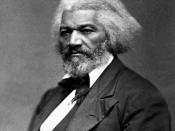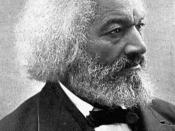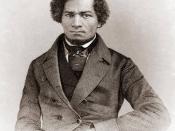Frederick Douglass' Narrative of the Life of Frederick Douglass, An American Slave, was his first of three autobiographies written about his experiences both during and following his life as a slave. It is his Narrative that lays the foundation for not only his following works, but for an entire genre. The Narrative is Douglass' tool for establishing himself as an abolitionist leader as well as an escaped slave. While the Narrative does hold much merit as a tale of political struggle, it seems to be charged more with the complications of the struggles endured in the attempt to progress on a spiritual level. This realm of spiritual development is then countered by the lack of movement on more concrete levels, specifically those of a uniform, legal liberation and a mental and emotional liberation from slavery's chains which bind the slave and free man alike. These opposite forces are in constant struggle with one another, making all cases of progress cases of regress as well.
Progression, for Douglass, becomes both a form and a cause of the regression that precedes it. It is somewhere in the middle of the movement forward and the regression back again that Douglass comes to know himself ; it is in the midst of this battle for spirituality that he encounters and develops his faith, he comes to terms with himself as a man, and he comes to terms with himself as not only a man, but a black man, and an American slave.
Douglass' Narrative is, in many parts, one that focuses much on physical events of his life. It is the reflection upon events in his life as they occurred. The physical, tangible details are important in the novel because they not only paint pictures of past experiences for the reader, but they...



Nice essay
Wow, this was really well done! I've just read Douglass' Autobiography and I think you've very much done it justice. Great job.
3 out of 3 people found this comment useful.